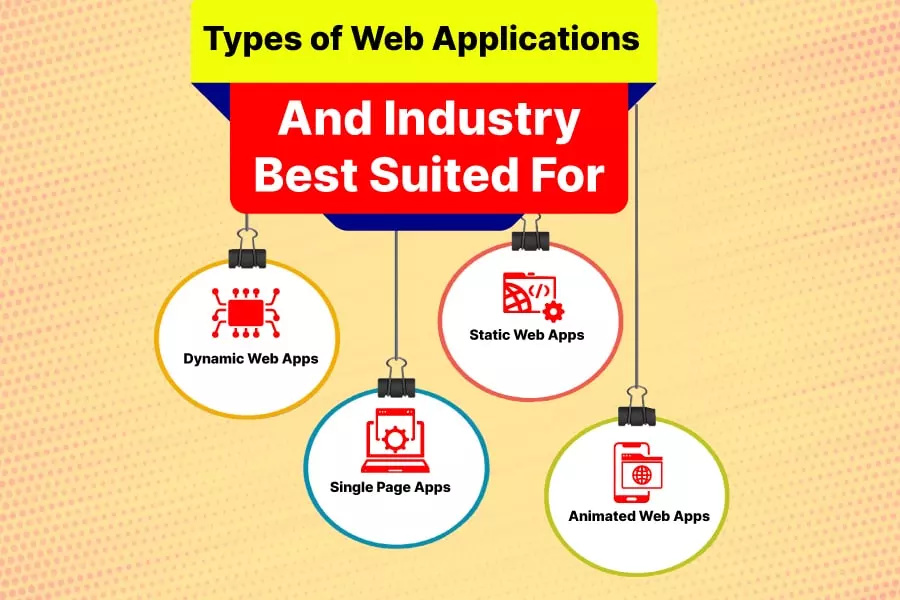
Let me guess. You want to build a web application for your business but want to know more about it first to make an informed decision. I get it.
Web applications can help entrepreneurs streamline business processes and reach a wider audience. It can also make communication with customers and prospects effective.
With the ever-increasing number of internet users, it’s apparent that brands seeking growth need web applications.
Statista report shows that five billion people use the internet. Now that’s approximately 63.1 percent of the entire world population.
Here, I’ll focus on web applications, types, and examples, including how they can benefit your business.
Alright, let’s dive deeper!
What Is A Web Application?
A web app refers to computer programs that utilize web browsers, including web technology, to perform specific functions.
Web applications can also run on any device. They can run on a desktop computer and even your mobile device browser on a tablet or phone.
An example of a web app is the contact form on a website.
Regardless of the device you use web apps on, it will remain responsive. These apps are also designed to be as interactive as mobile applications.
Furthermore, note that a web application is a client-server program. What does this imply? It means the web app boasts a client and server side, different from each other.
What does the term “client” on the client-server side mean? It refers to the program used to run the web application. And it is part of the client-server environment where tons of computer systems share information.
Regarding the database, the client refers to the program through which users enter data, while the server refers to the program used to store data.
The internet allows companies to communicate with customers and ensure they process transactions smoothly. But this can’t happen without the existence of the web application.
The web app allows businesses to capture and store data, with the results made available to users.
An example of a web app is the shopping cart. With this app, online shoppers can shop conveniently.
So, web applications are as vital to individuals or customers as they are to businesses. Each web app has a unique purpose for which it was built.
You may have witnessed how the shopping cart makes online shopping a breeze.
Companies also benefit massively from the use of web applications. Several departments can collaborate on the same project via a single web app. They can share reports and data and make inputs whenever and wherever they find themselves.
Web Application Functions You Should Know
I have shed some light on the function of web applications. But here, I would like to go a bit deeper.
These applications enable two-way communication between companies and customers. Some web apps help simplify the collection and exchange of information between businesses and customers.
The contact form you see on a website (Your website may likely be using this. Otherwise, let a professional create one for you immediately) is an example of a web application. I know you already know how significant this application is.
The contact form allows visitors who land on your web page to provide their details (name, active email, location, etc.). When a customer provides an email address, chances are the person is comfortable receiving your newsletter.
You can use this opportunity to convert such a visitor into a lead, prospect, and customer.
A Handy Tip: Leads and prospects aren’t the same. While the former is an unqualified contact, the latter is a qualified contact. Prospects refer to someone you have already moved into the sales prospect.
Now, let’s go back to the discussion on the function of web apps.
Let me also quickly state that web applications could be a part of a bigger website or be a standalone app. The contact form mentioned earlier is a web app incorporated into a website to serve a purpose for the site (collect visitor data).
Check out other functions of web applications:
- Run calculations
- Generate reports
- Manipulation of images
A Pro Tip: Web apps don’t need installation. Additionally, you can access them via any device (desktop, mobile device, or laptop computer).
Don’t forget web apps are apps stored on a remote server. You’ll require the internet and a browser to run a web app.
Types Of Web Applications And Industry Best Suited For
What are the types of web apps? We’re going to discuss them shortly. There are nine types of web apps, and they each have an industry they’re best suited for.
Now, let’s dive in.
1: Static Web Application:
This app is a wise choice for publishing companies. And you don’t need to install any third-party program to access it. You can access the static web app directly from the browser.
Another unique feature this web app has is that you can access it in offline mode.
Java, CSS, and HTML are the major programming languages used to build static web applications. Another thing I would like you to know about this app is that it is sometimes easy to build.
Or, maybe I am saying it’s easy because my team and I build static apps for fun. Anyway, incorporating fun into a web app project will make it enjoyable.
Furthermore, note that the static web app doesn’t pull data from the server. Instead, the content will be available on the user’s web browser.
You can get super creative when developing static web apps. You can incorporate GIFs and videos in your static web apps.
2: Dynamic Web Applications:
You might want to know which industry this web app is best for. Let me give you a quick hint.
The following industry will benefit immensely from dynamic web applications.
- Social Media
- Health care industry
- Transport and logistics
- Information Technology industry
- Retail and eCommerce industry
Dynamic web applications’ easy user management is one of the reasons they are widely used. You can manage your entire users on the site and ensure proper protection for your server.
What language is a dynamic web application built with? They are developed via server-side language and technology.
The dynamic web application allows the content of each page to be delivered based on user-generated content or user behavior.
Let me use Netflix, a dynamic web application, as an example. You’ll find movies in diverse genres when you log into your Netflix account.
Let’s say your preference is action movies. When you click on a specific action movie, other action movies in that genre will be displayed to you. That’s how a dynamic web application works.
A Pro Tip: In dynamic web applications, all your content and data are organized in a database or a backend CMS (Content Management System).
Examples of Dynamic web applications:
- CNN
- Disney Plus
- Netflix
- HubSpot
3: Single Page Web Applications:
The single-page app (SPA) does as its name suggests. This app works within a browser and loads only a single page.
An example of a single-page app is Gmail. I know you already know what SPA is with the example I have just provided.
What industry is the single-page app best for?
I have mentioned two industries where the SPA enjoys a broad application.
- Email service
- communication sector
One thing I like about the SPA is how it keeps the visual structure of the web app consistent, using presentation logic.
The single-page web application doesn’t need the page to reload. You can confirm this on Gmail, a good SPA example.
Click “Inbox” or any icon on your Gmail to access the content. You’ll discover that Gmail’s sidebar and header will remain the same.
Examples of single-page web applications:
Here are some apps considered single-page applications.
- Gmail
- PayPal
- Airbnb
- Google Maps
Many companies on the internet are utilizing single-page applications to build platforms that offer fluid and scalable experiences.
SPAs have become a must-have for Trello, Meta, Twitter, and the tech titan, Google.
4: Multiple Page Applications:
As the name implies, multiple-page apps (MPAs for short) consist of diverse pages. It is the direct opposite of the single page app.
In other words, while single-page apps boast only one page, multiple-page apps have several pages.
Another thing that characterizes these apps is that the whole page will reload when you try to load a page.
Below are industries multiple page apps are best for.
- eCommerce
- Enterprise industries
What makes the MPAs special? Several things make them a wise choice for the above industries. Remember, they have multiple pages, and you can optimize each for search engines.
A Handy Tip: Single-page web apps load faster than multiple-page apps. No individual that knows about web development will argue this.
You only have to load the single-page app once and never have to reload again until you leave the site.
Let’s use Amazon, an eCommerce platform using a multiple-page web application, as an example. When you click on an item, let’s say, “Multi-process welder,” the product will be added to your cart.
Once the item is in your cart, you have to click on next to move to the next page, then make payment, move to the next page, and so on.
Below are examples of multi page web apps.
- Amazon
- eBay
- Trello
- Forums
- Google Docs
5: Animated Web applications:
Animated web apps’ designs and approaches allow them to attract and grab visitors’ attention effortlessly.
Flash, CSS, SVG, JavaScript, and HTML5 languages are used to create animated web apps.
What industry are animated web applications best for?
- Gaming
- Animation
- Education
So, what’s an animated web app? This app supports synchronization and animation on the web platform.
An excellent example of an animated website is Google’s “Your Plan, Your Planet” website. Google created it to enable people to understand how their choices impact the planet.
6: Content Management System:
The Content Management System (CMS) is a program designed to manage digital content. CMS also improves the production and management of content.
What industry is CMS best for? Let’s take a quick look at the varied options we have.
- Blogging
- News portals
- Marketing and sales platforms
The exciting thing about building and using CMS is that you don’t require coding skills. The web app creates, modifies, and manages content.
So, what are the examples of the content management system? Check them out below.
- WordPress
- Joomla
- Drupal
- Wix
- Squarespace
- Magento (eCommerce)
- PrestaShop (eCommerce)
7: eCommerce Web Applications:
If you shop online regularly, you will know several eCommerce web app examples. One popular example of this web app is Amazon, a popular eCommerce platform where you can get a wide range of products from diverse brands.
What are eCommerce web applications? These apps are designed to help people purchase or sell online quickly.
The app is usually designed to enable sellers display pictures of various products. And you can search for products with ease, make payments online and place an order on the eCommerce web apps from the comfort of your home.
This web app is best for eCommerce businesses. It will allow your business to expand and reach a wider audience.
The app makes it possible for someone in a distant country like China to view products listed on a company’s eCommerce platform and make a choice. One doesn’t have to visit the business’ location in person to know the products they have in store.
The transaction and payment integrations are part of the eCommerce web apps, which makes them exceptional.
The app also draws on other technologies like mobile commerce, supply chain management, inventory management system, and the internet market.
Here are some examples of eCommerce web apps.
- Amazon
- eBay
- Walmart
8: Portal applications:
Examples of portal apps include Udemy and Coursera. These popular platforms offer courses in various fields, from Excel to IT, for a token.
Udemy and Coursera allow individuals from across the globe to learn diverse skills without paying hefty fees. The platforms host professionals from various fields.
You’ll find videos on various courses explained in detail.
What industry are Portal web apps best for? Government and student portal is where these apps are primarily deployed.
I have also mentioned two examples of portal apps.
9: Progress Web Applications:
Note that apps in this category are built using basic programming languages. These include JavaScript, CSS, and HTML.
What makes these apps unique is their responsiveness. Progressive apps are responsive, ensuring a better user experience.
Another thing that sets them apart is that they’re super easy to work with offline and online.
What industries are progressive web apps best for?
Diverse industries favor the use of progressive web apps. What I mean is these apps are used widely in these industries. Check them out below.
- Social media
- On-demand
- Healthcare industry
- eCommerce and retail industry
- Information Technology Industry
- Logistics and transportation industry
What are progressive web apps? It is easier to identify progressive web apps. How? These apps boast the latest cross-platform browser API (Application Programming Interface), including the latest features and advanced improvement techniques that allows web applications to deliver a similar experience as native apps.
A Handy Tip: A simple way to understand a progressive web app is for you to consider a responsive website and add native application functionalities to that website. That’s progressive apps.
Remember I mentioned that these apps are built using lightweight web tech? Why? The reason is to ensure progressive web apps are highly responsive. As you know, an app or website’s speed is vital for conversion.
Examples of lightweight web tech used are JavaScript, HTML, and CSS.
Below are examples of progressive web applications:
- BMW
- Uber
- Spotify
- Telegram
- Adidas
- Trivago
- Eleganza
- AliExpress
- The Washington Post
How Your Business Can Benefit From Web Application
Web applications can offer great value to your business. They create custom solutions that connect workflow and improve business processes, leading to higher efficiency and better return on investment.
Employees from different departments or even the same department can collaborate on projects with the help of web applications.
In addition to making collaborations within a company possible, web applications make it easier to generate reports, share and analyze data, including allowing team members to make valuable contributions whenever and whenever necessary.
A custom web app can put a business ahead of the competition. It will enable you to offer a better customer experience, improve ROI or even break into a new market.
So, web apps can offer your business numerous benefits, as you can see. These apps can make your staff work better and use their productive time well. They’ll also provide opportunities to take your business to the next level.
Conclusion
You have seen examples of web applications, including the various types of web applications and industries they are best suited for.
I took time to explain and provide these examples so that you can have a better understanding of web applications and make an informed decision when the need to develop a web app for your business arises.
Web applications are valuable to your business. These apps will allow you to streamline business processes, improve ROI, and cut down the cost of running your business.
Web applications can also run seamlessly on any device, making them accessible from anywhere. They are easily accessible and, as you already know, boast a wider reach.
Hire BitChip Digital For Web App Development
Are you interested in building a web app for your business and don’t know where to start or which app would be best? Do you need detailed insight into how using a custom web app can take your business to the next level?
If your answer is yes, you have come to the right place! BitChip Digital boasts the experience, skills, and foresight to build a web app that will help take customer experience to the next level, offer better ROI and even reduce the cost of running your business.
We build web and mobile applications for startups to large corporations, using cutting-edge technology and techniques.
Contact us, let’s talk.



